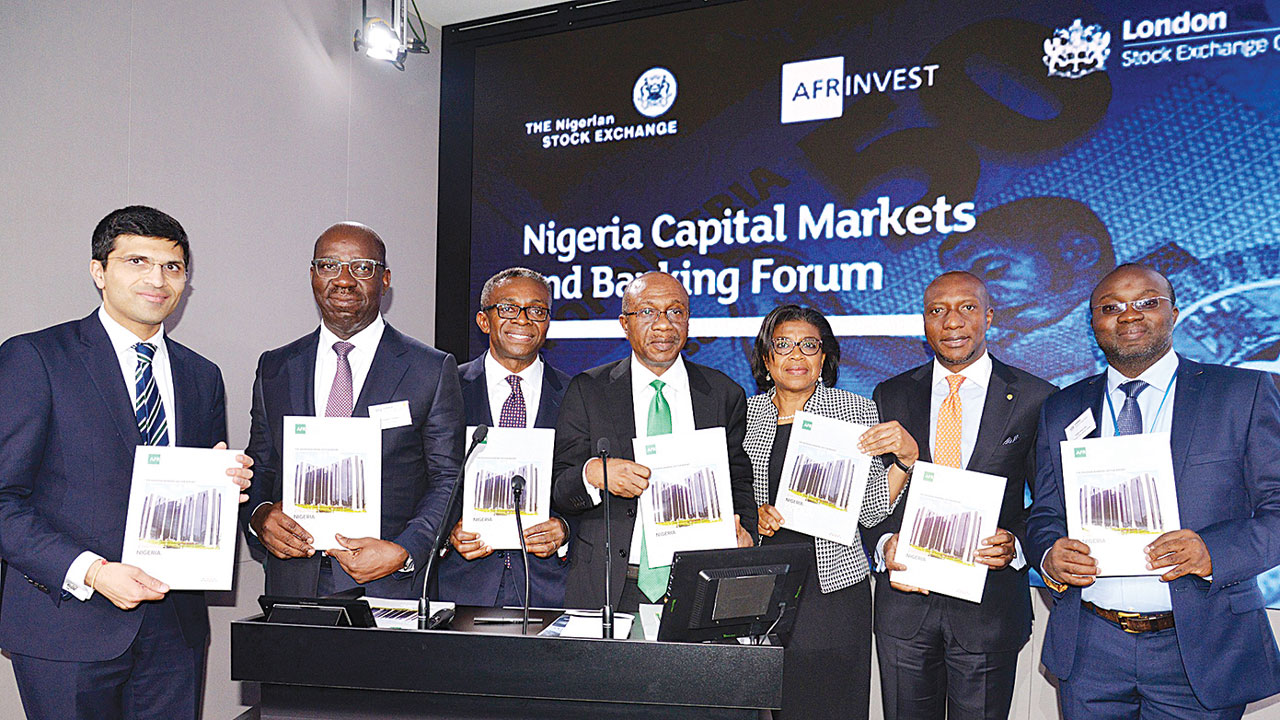- Emefiele Woos Global Investor-community in London
The Governor, Central Bank of Nigeria (CBN), Godwin Emefiele, at the weekend in London, urged global investors to come back to Nigeria, declaring that the country is ready for business.
Besides, he told them that the Returns on Investment (ROI) in all sectors of the economy in Nigeria are among the top performers in the world.
The event also coincided with the launch of the 2017 Nigerian Banking Sector Report by Afrinvest, which showed that Nigerian banks remain resilient and profitable despite headwinds emanating from the current economic situation in the country.
While addressing global experts in capital and money markets, investment bankers, treasurers and other fund managers at the London Stock Exchange, Emefiele, explained how renewed policy drive aimed at enduring improved business environment saw Nigeria emerge from its worst recession in decades.
Again, he reiterated the opportunities for investments inherent in the ongoing reforms in several sectors, particularly in agriculture, solid minerals and infrastructure financing.
Dispelling the fears over foreign exchange (forex), the bank chief assured of continuity in the ingenious management of the market that saw to the recovery of the Naira- establishment of the highly successful Investors and Exporters window, as well as the funding of agriculture under the Anchor Borrowers’ Programme (ABP).
Meanwhile, to achieve a more sustainable transition to a flexible exchange rate regime, there is the need for commitment to transparency and accountability in the management of the country’s forex market by all stakeholders.
The President and Chairman of Council of the Chattered Institute of Bankers of Nigeria (CIBN), Prof Segun Ajibola, who made the observation, described forex management as key enabler, as Nigeria strives to improve on the citizens Human Development Index, adjudged at the moment to be below the international minimum benchmark.
Speaking at the 2017 CIBN Fellowship investiture in Lagos, yesterday, he said that with over-reliance on imports of basic needs and export of mono-product- oil, the challenge of absolute and relative poverty remains very much with us.
“What more, we are, as a people, still exposed to the vagaries of the foreign exchange market. Once again, it should be reaffirmed that the macro-economic objective of exchange rate stability and equilibrium balance of payments position can be achieved if only we tame our high propensity to consume imported consumer durables and non-durables and promote non-oil exports, pursue the age-long import substitution strategies.
Speaking on the theme: “Coherent Set of Policies for Greater Exchange Rate Flexibility, he further stated that “while Nigeria as a country has experimented with different exchange rate regimes, opinions are still polarised among economic experts on the best policy option in the management of the country’s forex.
“Principally, there are two extremes of exchange rate regimes– fixed and floating, with different shades of combination. The choice of exchange rate regime depends on a country’s level of development and the policies governing the monetary and financial fundamentals of such economy.
“Most developing economies tend to adopt fixed exchange rate regimes in order to build confidence in their economic policies, whereas the more advanced ones lean towards a flexible regime as they become more active in international financial markets,” he said,
But the Guest Speaker and the Senior Resident Representative and Mission Chief for Nigeria, African Department, International Monetary Fund (IMF), Amnie Mati, stated that to achieve coherent set of policies for greater exchange rate flexibility, fiscal policies and structural issues must be addressed.
He also stated that the macro economy must be stabilised, but still advocated the harmonisation of the various exchange rates.
The Minister for Industry, Trade and Investment, Dr. Okechukwu Enelamah, who was represented by the Managing Director, Bank of Industry (BoI), Olukayode Pitan, alongside former Governor of Central Bank of Nigeria (CBN), Chief Joseph Sanusi urged the CIBN awardees to make a difference that would benefit members of the society.
According to them, only by standing for things that would lead to the overall benefit of the country, would Nigeria become great nation again.


 Forex3 weeks ago
Forex3 weeks ago


 Naira2 weeks ago
Naira2 weeks ago
 Billionaire Watch2 weeks ago
Billionaire Watch2 weeks ago




 Naira2 weeks ago
Naira2 weeks ago




 Naira2 weeks ago
Naira2 weeks ago




 Naira1 week ago
Naira1 week ago




 Naira3 weeks ago
Naira3 weeks ago




 Naira4 weeks ago
Naira4 weeks ago





















